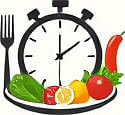Motivational Food Journaling for Balanced Eating
 by Thaddeus Blanda
by Thaddeus Blanda
Discover how food journaling can inspire busy professionals to adopt meal prep techniques and quick recipes, making nutritious eating achievable amid work demands. Learn practical hacks to save time and stay motivated through simple tracking methods.

Food journaling serves as a key tool for busy professionals aiming to maintain a healthy diet. It involves noting down daily meals, ingredients, and preparation methods, which helps build awareness of eating habits.
One effective way to begin is by focusing on meal prep. This practice allows individuals to prepare portions in advance, reducing daily cooking time. For instance, setting aside time on weekends to chop vegetables and cook proteins can lead to ready-to-go meals during the week.
In your journal, record the steps taken for each session. This might include listing the items used and the time saved, providing a clear view of progress over time. Quick recipes play a vital role here, offering options that fit into tight schedules. Consider a simple stir-fry using pre-cut veggies and lean protein, ready in under 15 minutes.
By documenting these recipes in your journal, you create a personalized collection that motivates repetition of successful meals. Time-saving kitchen hacks, such as using a slow cooker for hands-off cooking or batch preparing grains, can also be tracked.
Benefits of Tracking in a Journal
Keeping a journal encourages consistency and reflection. Write about how certain hacks, like organizing your pantry for easy access, streamline routines. This reflection can reveal patterns, such as which quick recipes lead to better energy levels.
For example, a journal entry might note a recipe for overnight oats, prepared with oats, fruits, and nuts the night before. Over time, reviewing these entries builds a sense of accomplishment.
Integrating Hacks into Daily Life
To make journaling more engaging, incorporate visual elements like sketches of meals or notes on flavors. This turns the process into a rewarding habit rather than a chore.
Focus on kitchen hacks that enhance efficiency, such as using multipurpose tools to minimize cleanup. Documenting these in your journal helps reinforce their value, showing how they contribute to overall well-being.
Staying Motivated
Regular journaling fosters a positive mindset by highlighting achievements, like sticking to nutritious meals despite a hectic schedule. Set small goals, such as trying one new quick recipe per week, and note the outcomes. This approach keeps the process fresh and encouraging.
Ultimately, food journaling empowers professionals to take control of their eating habits. By combining it with practical techniques, it becomes a pathway to sustained health and balance.
